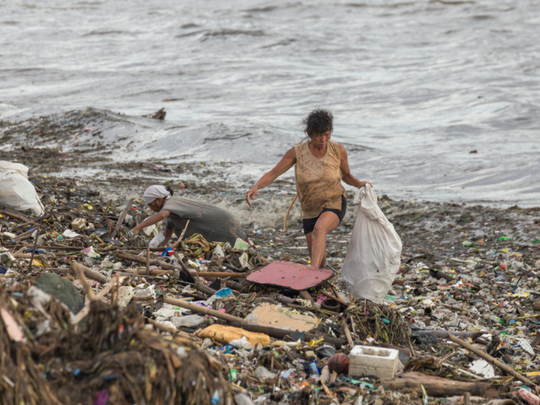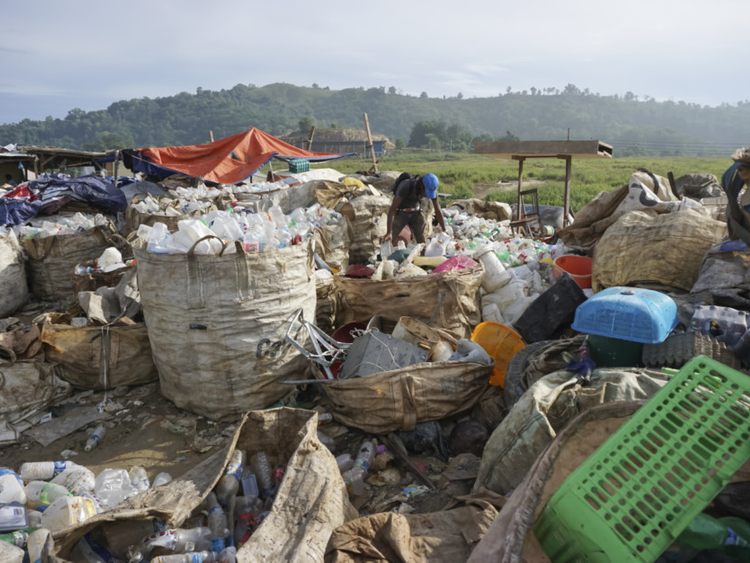
Kuala Lumpur: When Seah Kian Hoe was just 10 years old, he would jump on the back of his parent’s small truck during school holidays and help them collect scrap, going door-to-door around neighbourhoods in Malaysia’s southern state of Johor.
Taking their haul back to the family yard, they would spend hours separating the glass bottles, aluminium cans, discarded newspapers and metal.
Seah now employs 350 people to help him run Heng Hiap Industries, one of Malaysia’s top five plastic recycling businesses, which processes about 40,000 tonnes of waste per year from both domestic and overseas suppliers.
“Thirty-five years ago, it was just scavenging — a very different era compared to now,” Seah said.
Heng Hiap Industries is just one of the Southeast Asian plastics recycling companies gearing up to benefit from China’s decision to ban imports of plastic waste from the start of 2018.
Before the ban, which shocked many in the industry, China was the world’s dominant importer of such waste. In 2016, it imported 7.3 million tonnes of waste plastics, valued at $3.7 billion, accounting for 56 per cent of world imports.
Over the past two decades, China was keen to suck in as much plastic waste as possible, helping feed its manufacturing expansion. But policymakers took action after a string of scandals involving unscrupulous players in the waste market.
Plastic China, an award-winning documentary released in late 2016, ignited further public outrage by highlighting the human and environmental costs of the under-regulated, Wild West-style recycling industry.
As part of efforts to clean up China’s environment, Beijing launched a campaign against harmful “foreign garbage” last year.
Some of the worst-hit exporters of plastic waste are based in the US and Britain — leaving those two countries scrambling to find alternative places to take their rubbish.
Trash trouble
“The industry was not prepared for it,” said Surendra Patawari Borad, a businessman who runs a recycling company in Belgium and the US and chairs the plastics committee at the Brussels-based Bureau of International Recycling (BIR).
Unable to send their plastic waste to China, Britain and the US are now likely to increase their domestic recycling capacities in an effort to reduce exports.
But industry officials say this could take years and may still not be enough.
“If anyone has a problem selling their scrap plastic right now, they should not be complaining — they should be looking at themselves because this ... has been on the cards for quite a while,” said Damien van Leuven, founder of Vanden Global, an international plastics recycling company based in Hong Kong.
Faced with growing stockpiles of plastic waste, many companies are either burning some plastics for energy recovery or sending the materials to landfills, several industry researchers said.
Both of these methods will have a catastrophic impact on the environment, they warned.
The labour-intensive job of taking bales of plastic waste to be broken down, cleaned, separated into different plastic resins and finally made into pellets ready to be reshaped into new products is now expected to fall to Southeastern Asian countries.
Malaysia, Vietnam, Indonesia and Thailand are among the countries that have attracted Chinese investors in the plastics recycling sector over the past year.
Rules needed
Most have yet to develop public awareness about the issue, but their access to cheap labour and proximity to China’s manufacturing industries work in their favour.
The industry fears, however, that a flood of unregulated plastic waste to these countries could lead to similar problems as those experienced in China, resulting in copy-cat bans.
To avoid this, industry officials urged Southeast Asian nations to tighten health and safety regulations.
To date, the world has produced more than 8 billion tonnes of plastic, said BIR. Only 9 per cent has been recycled, while just under 80 per cent has been treated as waste.
— Reuters













